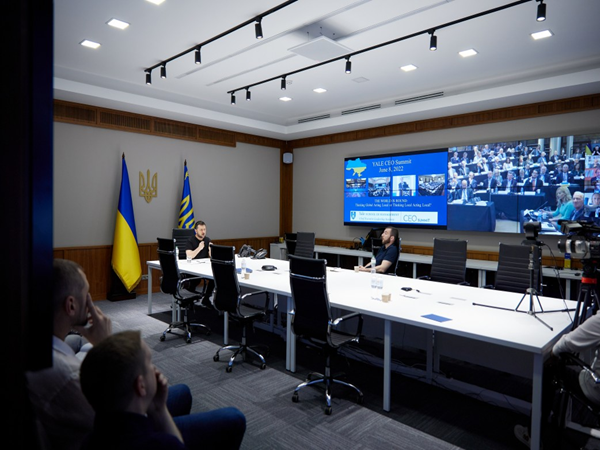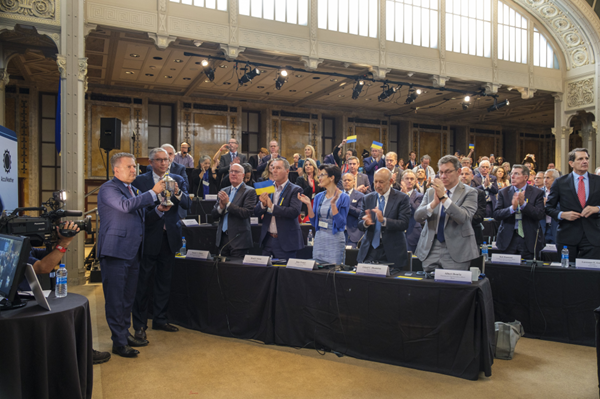
COMMENTARY •
UKRAINE INVASION
Zelensky unplugged: Ukraine’s president gives American CEOs
advice and sobering warnings about ‘our common war’
BY JEFFREY
SONNENFELD AND STEVEN
TIAN
June
14, 2022 6:25 PM EDT
|

Ukraine President Volodymyr Zelensky, seated
at the head of the table, addresses the Yale CEO Summit via video feed on
June 8, 2022. "I’d like your companies to consider not only the option of
leaving Russia, but also finding their place in the Ukrainian economy,"
Zelensky told the group.
COURTESY OF YALE CHIEF EXECUTIVE LEADERSHIP
INSTITUTE |
Lord
Frederick North, Britain’s Prime Minister during the U.S. Revolutionary War, is
said to have once proclaimed, “The only vacation I need is a different set of
problems!”
Surely
U.S. business and political, leaders feel the same way today, given the historic
confluence of soaring inflation, lingering supply chain shortages, looming
recession fears, a resurgent pandemic, immigration surges on its borders, mass
shootings, white nationalist violence, an historically divisive political season
going into the midterm elections, and elevated battles on such core matters as
voting access and abortion rights.
In an
unprecedented give-and-take with top U.S. business leaders and mayors last week,
Ukraine’s President Volodymyr Zelensky provided the audience with a different of
problems—but that “vacation,” while invigorating, was hardly relaxing. He
warned, “If the enemy can reach us, it can reach every country of the European
Union. And I’m sure that the enemy can reach the United States. We strive to
defend the principles of democracy and freedom."
Zelensky’s past meetings with such bodies as the UN Security Council, the EU,
the U.S. Congress, and the Davos crowd have been characterized by warnings about
Russian imperialism, pleas for needed weaponry, the sluggish delivery of those
weapons, and scolding over the need for enhanced sanctions. But this time, his
tone and message was different.
He
joined our 133rd Yale CEO Summit—a gathering of 150 top CEOs and 35 major city
mayors that we convened in New York on June 8. Zelensky established a personal
rapport, thanking these leaders for their
historic retreat from doing business in Russia. He also shared some
sobering insight into the strategic implications for them of Ukraine’s noble
battle and discussed ways they can help beyond lobbying for military support.
He was
greeted by unanimous enthusiasm as most CEOs wore Ukrainian flag colors and
spontaneously leaped
to their feet for multiple standing ovations. In a survey after the
event, fully 100% of participants, agreed that they were “inspired by Ukraine’s
demonstration of courage and unity”, and 96% agreed that the 1,000 companies
that have already curtailed operations in Russia, which we estimate collectively
represent close
to 40% of Russian GDP, did the right thing and that their exits were
rewarded in financial markets.
While
most coverage has focused, deservedly, on our unique format and the remarkable
strength of U.S. support, that is far from the only message. Zelensky’s
impromptu responses, reported here for the first time, offered revealing, candid
insights into Ukraine’s evolving strategy, as the conflict enters a more
difficult, prolonged phase. And perhaps most notably for Fortune’s
readership, they focused on what business leaders can do to support Ukraine.
'We
need to work on rebuilding Ukraine'
U.S. businesses should not only leave Russia, but support Ukraine
Zelensky reiterated the importance of companies exiting Russia and not paying
taxes to the Russian government, which “finances the Russian war machine killing
Ukrainians.” He also simultaneously presented a new, multifaceted vision for how
business leaders can support Ukrainian reconstruction.
Specifically, in response to questions from CNBC’s Sara Eisen and Chobani’s
Hamdi Ulukaya, he offered “concrete steps businesses can take.” Among them:
Hiring highly
trained Ukraine-based tech workers for remote jobs; hiring Ukrainian
refugees, with 5 million having fled Ukraine since the beginning of the
invasion; investment in strategic growth sectors such as digitalization and
green renewable energy; continuing purchases of Ukrainian exports; and aiding
the rebuilding of the country’s decimated infrastructure and industrial
capabilities.
'We
need a powerful Ukraine'
The only way to counter Russia is by strengthening Ukraine
Rebutting naive appeasement stances echoed by those trapped in a Perestroika
time warp, including Henry Kissinger, Zelensky strongly reiterated his message
that western businesses should not support any negotiated political settlement
which cedes territory to Russia.
In
response to questions from Lloyd Blankfein of Goldman
Sachs, Zelensky argued that while economic pressures may make the
illusion of a negotiated peace ceding Crimea and the east to Russia attractive,
Ukraine is at the forefront of a global struggle for democracy and freedom, and
any settlement with Russia would only lead to more expansive attacks from Putin
in the years ahead, making the role of business in helping with the rebuilding
of Ukraine all the more important. Zelensky encouraged business leaders to
“whisper in the ears of political leaders” against misguided attempts at
appeasement, since, as he said, “Ukraine is willing to put an end to this
war—but not at the price of our independence."
'A tsunami'
of hunger
Disruptions to agricultural exports are leading to global famine
In
response to questioning from Jane Fraser of Citi on the war’s disruption of
agricultural commodity markets, President Zelensky pulled no punches, making it
clear that the world is barreling towards global famine due to Russia
“perpetuating an artificial crisis.”
Not
only has Russia blockaded crucial export ports on the Black Sea and Azov Sea and
hijacked Ukrainian grain shipments, but Russia has been maliciously destroying
agricultural infrastructure and disrupting the entire supply chain. Seeds are
not being planted, as Putin’s invasion has coincided with planting season. This
will lead to diminished crop yield in the annual fall harvest. Meanwhile, 20
million tons of grain inventory in silos are being bombed, while the remaining
inventory and what is left of the fall harvest face increasing challenges in
getting to market. That’s a disaster in the making for global food security,
considering Ukraine supplies nearly 20% of the world’s grain and corn, and
nearly 50% in other key agricultural products such as sunflower oil.
Zelensky
asked business leaders to lend their voices in support of secure maritime
corridors to ensure Ukrainian agricultural exports can get out of the country.
Beware the overlooked consequences of the invasion
When
asked by Ethan Allen CEO Farooq Kathwari about the unintended consequences of
the invasion, President Zelensky pointed to the second- and third-degree
humanitarian costs devastating civil society, even beyond the murder of
thousands of innocent civilians:
- 12
million Ukrainians forced to flee their homes without IDs, papers, clothes, or
money
- 5
million refugees to foreign countries
-
massive loss of jobs
-
closing of shops and grocery stores
- once
thriving cities such as Mariupol that have been 90% flattened by prohibited
weapons such as cluster bombs
-
disastrous environmental contamination of flooded mines;
-
toxic waste and contamination of potable water
-
children who are not going to school
- the
forced eradication of the Ukrainian language from schools in Russian-controlled
areas
-
refusal to deliver medication to civilians behind Russian lines
-
inability to pay out pension guarantees.
President Zelensky pleaded for additional corporate, humanitarian aid and
encouraged business foundations to provide targeted assistance through the
official United24 Ukrainian state platform.
At the
session with us was Zelensky’s economic advisor, Andriy Boytsun; and Nataliia
Shapoval of the Kyiv School of Economics. They offered a
newly released white paper from the Yermak-McFaul Working Group on
Sanctions that offers interesting information on possible next steps.
The
purpose of these proposals is to undermine Russia’s ability to wage war and to
end the Russian aggression as soon as possible. The paper suggests
individual-level sanctions targeting tens of thousands of Russian have helped
undermine Putin’s war through asset freezes, travel bans, and other restrictions
aimed at oligarchs, top Russian government officials, key Russian executives,
and wartime propagandists.
Our
prominent “List
of Companies” leaving/remaining in Russia continues to catalyze
companies to exit Russia while depriving Russia of ever-more tax dollars. "This
is our common war,” Zelensky told the gathered leaders. “The companies that are
represented in the Russian market should leave. The most important thing is, do
not pay taxes to the Russian financial system, because this money is used to
fund this Russian war machine that is killing Ukrainians. As the president of
Ukraine, I’d like your companies to consider not only the option of leaving
Russia but also finding their place in the Ukrainian economy, because this is
important in terms of employment for our economy to deal with the tremendous
challenges that we are facing."
|

Sergiy Kyslytsya, Ukraine's ambassador to the
UN (far left), accepts an award from members of the Yale CEO Summit on
behalf of Zelensky on July 8 in New York City.
COURTESY OF YALE CHIEF EXECUTIVE LEADERSHIP
INSTITUTE |
Russia
will come to the bargaining table only if they are weakened. But for the
business community, helping weaken Russia by curtailing operations is only one
part of the equation. The comprehensive framework President Zelensky offered for
how businesses can continue to contribute to what he called a “stronger
Ukraine” looks toward the future. Zelensky offered not just a different set of
problems but also a different set of solutions.
Jeffrey Sonnenfeld is a senior associate dean and the Lester Crown professor of
management practice at the Yale School of Management, and president of the Yale
Chief Executive Leadership Institute. Follow
him on Twitter.
Steven Tian is director of research for the Yale Chief Executive Leadership
Institute.
The opinions expressed in Fortune.com commentary pieces are solely the views of
their authors and do not reflect the opinions and beliefs of Fortune.
© 2022 Fortune Media IP
Limited. |

